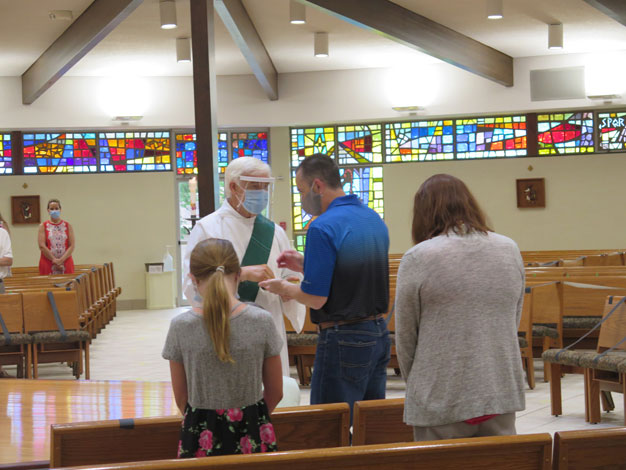
Deacon Daryl Fortin distributes Communion during a Mass at St. John Vianney Church in Bettendorf in June.
By Lindsay Steele
The Catholic Messenger
As the number of COVID-19 cases and hospitalizations skyrocket in the state of Iowa, Bishop Thomas Zinkula urges diocesan Catholics to “double down” on all current safety protocols.
On Nov. 10 and Nov. 16, Governor Kim Reynolds issued a series of social-distancing and mask-wearing guidelines for public and private gatherings, sporting events, restaurants and bars, and personal service establishments. The Governor’s proclamation prohibits indoor social gatherings of more than 15 people and outdoor gatherings of more than 30 people. That includes wedding and funeral receptions, family gatherings, festivals, conventions, fundraisers and other nonessential gatherings. This applies to our Catholic parishes and schools as well.
The Diocese of Davenport has its own set of protocols for diocesan entities to follow. Churches reopened for public celebration of Mass in June and schools resumed in-person learning this fall. Protocols for people attending Mass include mask-wearing, six-foot distancing between households, omitting singing, limiting the duration of worship services to approximately 30 minutes and sanitizing.
“At this point, the regulations and protocols we already have in place are more strict than what the Governor has implemented. However, as we know, this remains a serious public health crisis,” Bishop Zinkula said. “Any meetings or events that can be held virtually should be. Discretion is left to local pastors regarding discontinuing in-person Mass where they determine that case numbers are high enough locally to warrant this.” He encouraged priests to remind people at increased risk of infection to take precautions for their safety, which may include forgoing Mass. “The dispensation to attend Mass is still in effect.”
In response to the increase in cases, parishes took to social media to remind the faithful how they can participate in Mass, in person or at home. Many parishes offer livestream Masses. Some parishes offer “drive up” opportunities for the faithful to listen from their cars and receive Communion.
Hospitals at capacity
The Iowa Department of Public Health on Nov. 15 reported a record number of hospitalized patients, with 1,392 individuals seeking care statewide. One month ago, the department reported about 450 hospitalizations statewide.
The state reports that 2,790 inpatient beds, 354 ICU beds and 850 ventilators remain available to Iowans. However, some hospitals — especially in rural areas — have reached capacity or have a shortage of available staff, meaning patients may be transferred to a larger hospital elsewhere. Steve Scheckel, Mercy Iowa City’s chief medical officer, said last week in a virtual emergency meeting with Iowa City-area leaders that only 2 of the 17 hospitals in southeast Iowa had available ICU beds. “Eastern Iowa hospitals are pretty much at their maximum capacity,” he said.
University of Iowa Hospitals and Clinics’ head epidemiologist, Jorge Salinas, said in a Nov. 10 Facebook Live event that the increase of COVID-19 cases is “problematic at many levels. When the incidence of COVID goes up in the community there are more people who are sick, who cannot go to school, to work, they may need to go to the hospital,” he said. “This amount of transmission can put too much pressure on to hospitals and can impact the health outcomes of those who have COVID-19 and those who don’t have COVID-19.”
He expressed optimism about reports that a vaccine with 90 percent efficiency will be available by the end of the year, though it is unclear how many doses will be available at that time. “I think that this is going to change the game all together and will help decrease the numbers tremendously in the United States and globally,” he said.
Hospitals in the diocese, citing overflowing emergency rooms, are encouraging people to seek COVID-19 testing elsewhere if their symptoms are mild. Governor Reynolds on Nov. 16 said hospitals must prioritize COVID-19 cases by reserving a percentage of their intensive care and medical/surgical beds for patients with COVID-19. If a hospital cannot meet these requirements, the hospital must suspend nonessential, inpatient surgeries, with the exception of surgeries that would pose a significant risk to the patient’s quality of a life if delayed.
St. Ambrose goes virtual
Due to a rising number of positive COVID-19 cases in the community and on campus, St. Ambrose University announced Nov. 12 that it would convert most undergraduate and graduate classes to distance delivery learning through the remainder of the fall semester. All face-to-face extracurricular activities, including most athletic events and practices, are suspended until further notice.
Residence halls will remain open to all students through 6 p.m. on Nov. 24, but students who choose to return home for the remainder of the semester may do so. The university will conduct the final weeks of fall classes and final exams after Thanksgiving online, as originally scheduled.
The Winter Commencement schedule (Dec. 18 and 19) remains unchanged, with limited attendance for events and adherence to current CDC and State of Iowa guidelines. Spring semester is scheduled to begin Jan. 25 with face-to-face and hybrid learning and open residence halls. The semester will conclude May 14, and will not include a spring break.
Diocesan schools respond
Public schools in Burlington, Muscatine, Davenport, Iowa City, Muscatine, Fort Madison, West Liberty, Keokuk and elsewhere began to convert temporarily to remote learning this month due to an increase of cases and a shortage of available teachers. Catholic schools have largely been able to stay open. The state of Iowa requires schools to offer at least 50 percent of instruction in person, but grants two week waivers on a case-by-case basis.
High school students at Burlington-Notre Dame began remote learning Nov. 13 out of an abundance of caution, said Principal Bill Maupin. “We had several positive (COVID-19 cases) and several students out for testing. The Board looked at the county rate (21.2%), the absent rate due to illness in the 9-12 grade, which was 9%, and that we had several students who we did not know if they would be positive or not.”
Several diocesan schools rely on public school systems for busing, special education and other services. When the Davenport Public School District announced a move to remote learning Nov. 12, Davenport Catholic School principals expressed concern because the public district provides busing services to Catholic school students. Ultimately, the public district offered to continue providing this service.
On Nov. 17, All Saints in Davenport announced it would move to online learning through Dec. 7. “We’ve now reached the point at which the benefits of in-person learning are outweighed by the disruption caused by abrupt transitions to quarantines and by the risk of COVID-19 exposures within our building to our staff and students,” principal Jeanne VonFeldt said in an email to parents. “Please continue to pray for our school community at this time. This decision wasn’t made lightly as we know it will impact your daily lives but it is a decision, we felt was best to be made now to keep all of our students and staff safe.”
Keokuk Community School District provides special education services, busing services and lunch services to St. Vincent School in Keokuk, which has had “minimal staff absenteeism,” said secretary Tammy Boyle. The community school district went remote on Nov. 11, but “they have been very accommodating to our needs during their switch to all virtual learning. We have had very limited interruption to our routine.” Special education teachers arranged to meet with St. Vincent students at the Catholic school or online, and the district continues to provide busing and lunches to students. “However, we did have to adjust our student lunch time in order to give (the district) the opportunity to staff the six sites that they offer for parents to pick up meals,” Boyle said.
Holy Trinity Catholic Schools (HTC) in West Point and Fort Madison also rely on the local public school district, Fort Madison Community, for busing. Currently, HTC is using two of its own buses — driven by Fort Madison Community School District bus drivers — for a shuttle service between West Point and Fort Madison, said Brenda Graham, HTC’s marketing and admissions director. Families who live in communities outside of Fort Madison and West Point have either made their own transportation arrangements or have opted to switch to virtual learning until the public school district resumes in-person instruction, she said.
Regina Catholic Education Center has its own bus service, and school officials said Regina has not been impacted by Iowa City Community School District’s transition to remote learning. Glenn Plummer, principal of Regina Junior/Senior High School, said the school is not considering a move to “being fully online” at this time. “Our absenteeism due to illness is what it would normally be like at this time of the year, if not lower. We have had fewer than six students and zero staff test positive for the virus. In addition to in-person learning we offer the ability to choose online or hybrid so families can select whatever method is most comfortable for their individual family during the pandemic.”
Stay vigilant
Bishop Zinkula encourages the faithful to use discretion in their daily lives in an effort to slow the spread of COVID-19. “Minimize the period of time you interact with people outside your household” and wear masks. “Wearing a mask is a small sacrifice to make for a pro-life community that loves one another and is concerned about the common good.”











